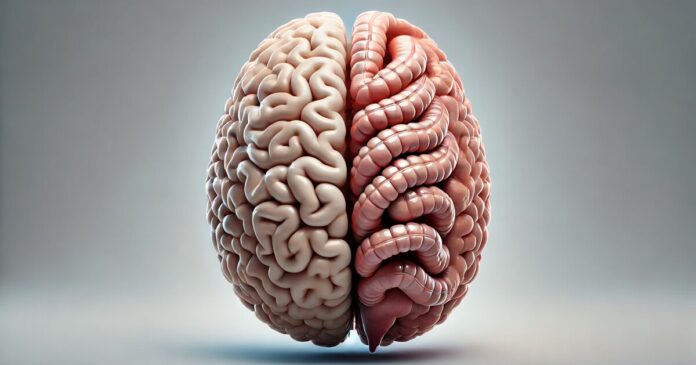Injecting a natural hormone directly into the gut has been shown to reduce cognitive impairment that follows a stroke in the long term, according to a recent study. This discovery adds to the existing body of evidence linking a healthy gut with a healthy brain and opens up possibilities for a treatment that can lessen the chronic consequences of a stroke.
With numerous studies confirming the connection, it is now widely accepted that the gut and brain are intricately linked, with the health of one impacting the health of the other directly.
On a global scale, approximately one in four people over the age of 25 will experience a stroke at some point in their lives. While the immediate symptoms of a stroke are well-recognized and treated through intensive therapy, the long-term effects such as cognitive impairment and depression resulting from brain cell damage can be more challenging to address. However, researchers at Texas A&M University have leveraged the gut-brain connection to shield the brain from the enduring effects of a stroke using a naturally occurring hormone.
Dr. Farida Sohrabji, the Head of the Department of Neuroscience and Experimental Therapeutics at the University and the lead author of the study, stated, “Stroke is a leading cause of dementia and Alzheimer’s disease. While the immediate effects of a stroke are clear, there are also long-term consequences that impact the quality of life for both the patient and caregivers. Therefore, there is significant interest in understanding how to enhance long-term outcomes.”
The focus of the researchers was on the less visible internal impacts of a stroke, specifically examining changes in the gut following the event rather than the external signs and symptoms.
Sohrabji further explained, “You have individuals who can’t lift their arms, whose faces droop on one side, their speech is slurred. That’s classic and occurs very quickly. What we’ve found is that minutes after a stroke occurs, normal gut anatomy is completely disrupted.”
During a stroke, the intestinal wall, which usually acts as a barrier between the gut and the rest of the body, becomes permeable. This allows digestive bacteria to escape the gut through the compromised wall and harm other bodily systems, including the brain. Even if the bacteria do not reach the brain directly, they can trigger a widespread inflammatory response that exacerbates the stroke’s effects, causing further brain damage and elevating the risk of long-term cognitive impairment.
Sohrabji emphasized, “If you just repair the brain, you will see short-term effects but not long-term improvement because the gut is still leaky. It’s causing inflammation and constantly impacting brain function in the long term.”
This study built upon previous research by the team, which had demonstrated that the hormone insulin-like growth factor-1 (IGF-1) reduced the levels of inflammatory cytokines in the brain region affected by the stroke. However, it did not offer insights into the impact of IGF-1 on cytokines circulating outside the brain. Rats with left-sided strokes were administered either IGF-1 or a placebo four hours post-stroke for 48 hours, and their cognitive and sensory-motor functions were tested alongside an evaluation of their gut health.
The study revealed that the effectiveness of IGF-1 treatment depended on the route of administration. Injecting IGF-1 into a vein to circulate in the bloodstream resulted in significant neuroprotection by reducing the size of the infarct (the area deprived of blood and oxygen due to the stroke) and improving sensory-motor performance in the short term. However, it had no impact on cognitive impairment in the long term. Conversely, administering IGF-1 directly to the gut yielded the opposite outcome, with no improvement in acute outcomes but substantial amelioration of chronic cognitive impairment.
When IGF-1 was delivered to the gut, it did not reach the brain, prompting the researchers to hypothesize that it influenced the body’s peripheral immune organs, altering the production of immune cells and preventing brain degeneration in that manner.
The researchers stated, “The current study strongly suggests that the gut can be a direct or intermediary target for long-term benefits in stroke outcomes. This adds to the growing body of research showing that improving gut health can aid in recovery from acute neural injuries and, conversely, that gut health can impact neurological function.”

In addition to their work with IGF-1, the researchers are exploring the transplantation of healthy intestinal stem cells into a gut that has been damaged by a stroke. Sohrabji was the corresponding author of a 2023 study investigating this innovative treatment.
Sohrabji elaborated, “We were fairly confident that the stem cells would repair the gut. What was not known, and what pleasantly surprised us, was that it also improved stroke outcomes. As a result of the treatment, the amount of dead tissue in the brain caused by the stroke was reduced, and cognitive function was preserved.”
The researchers are committed to furthering their research to develop a treatment that can alleviate the long-term cognitive effects experienced by stroke patients.
The study was published in the journal Brain, Behavior, and Immunity.
Source: Texas A&M University




